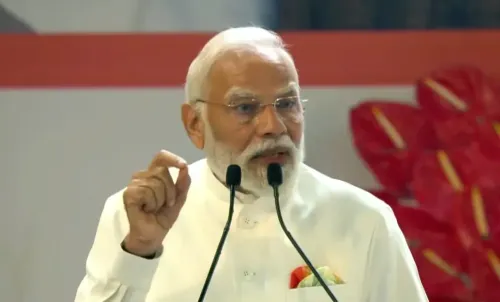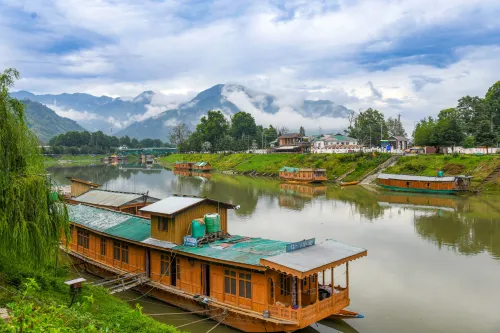Who Were the Terrorists Killed in the Srinagar Encounter Linked to the Pahalgam Attack?

Synopsis
Key Takeaways
- The mastermind behind the Pahalgam attack has been eliminated.
- Operation Mahadev highlights the intensified efforts of security forces against terrorism.
- The operation involved multiple security agencies collaborating in a challenging terrain.
- The shift in focus towards the terror ecosystem is a strategic development in national security.
- Targeted strikes against terror infrastructure in Pakistan have been carried out post-attack.
Srinagar, July 28 (NationPress) A former soldier from Pakistan, now turned terrorist, identified as the alleged mastermind behind the horrific Pahalgam attack, was among three Lashkar-e-Taiba (LeT) militants neutralized by security forces during 'Operation Mahadev' in the Srinagar district of Jammu and Kashmir on Monday, officials reported.
This significant achievement coincided with a Lok Sabha debate regarding the Pahalgam attack and the subsequent Operation Sindoor, aimed at dismantling terror infrastructures in both Pakistan and Pakistan-occupied Kashmir.
According to officials, the three militants, eliminated during a confrontation with a joint task force that included the army, the CRPF, and Jammu & Kashmir Police, were all Pakistani nationals affiliated with LeT and were operating in the upper reaches of Dachigam National Park near Mahadev Peak in the Harwan area of Srinagar.
Among them was Suleiman Shah, recognized as the mastermind behind the April 22 terror attack in Pahalgam. Security sources have confirmed his identity as one of the three terrorists killed during the encounter.
“Today's operation, dubbed Operation Mahadev, resulted in the neutralization of three terrorists - Suleiman, Abu Hamza, and Jabran. Jabran is also believed to be linked to the Pahalgam attack,” an official stated, adding that security forces from the region.
“Suleiman had previously served in the Pakistan Army and was also known by the name Hashim Moosa. Following the Pahalgam attack in Baisaran Valley, Jammu & Kashmir Police had declared a reward of Rs 20 lakh for any information leading to his capture,” an official remarked.
The three terrorists were killed after an intense gunfight erupted during an anti-terror operation initiated by security forces in Dachigam National Park based on intelligence reports. Reinforcements were dispatched to the area due to its dense population and challenging terrain,” the official stated.
The Indian Army, Jammu & Kashmir Police, and other security forces have been conducting vigorous anti-terror operations throughout the region, specifically targeting terrorists, Over Ground Workers (OGWs), and sympathizers to dismantle the terror ecosystem in the Union Territory.
Previously, the primary focus was solely on the elimination of terrorists. However, since 2019, Lt Governor Manoj Sinha has emphasized a broader narrative around anti-terror operations, addressing the entire terror ecosystem.
This shift in strategy has dramatically transformed concepts of security, as all anti-national elements, regardless of their level of armament, have been included in the anti-terror operations. Following the April 22 attack by Pakistan-backed LeT terrorists in Baisaran meadow, which resulted in 26 casualties, anti-terror operations have increasingly employed advanced technology and human intelligence to thwart terrorist activities.
The atrocious Pahalgam attack sparked outrage across the nation, prompting Prime Minister Narendra Modi to grant the armed forces authority to retaliate against the incident.
Targeted strikes were subsequently carried out by the Indian armed forces against terrorist infrastructure deep within Pakistan, successfully demolishing nine terror bases.
In retaliation, Pakistan targeted both military and civilian facilities, resulting in extensive damage to homes and religious sites, including a temple, gurdwara, and church in the Poonch district of Jammu division. The escalation led to damage sustained by 18 defense bases of the Pakistan armed forces.









